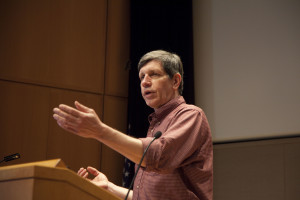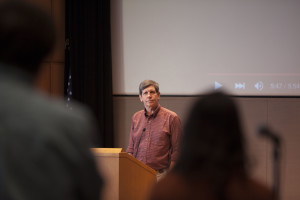
How the confluence of citizen activism, science and journalism led to uncovering Flint’s water disaster
By Austin Hong
During a plenary talk at DCSWA’s 2016 Professional Development Day, Curt Guyette pulled back the curtain on the Flint water crisis, exposing the extent to which the city, state and even federal governments failed to ensure clean water for the Michigan community. However, Guyette also told an even larger story – one about the breakdown of democracy.
As an investigative reporter for the American Civil Liberties Union (ACLU) of Michigan, Guyette’s civil rights focus highlighted the essential element of the crisis. Flint was more than just a failure of government process, he said – it was a systematic suppression of a community’s basic rights.
Guyette began the session with a short video he had produced with the ACLU of Michigan during the summer of 2015, titled “HARD TO SWALLOW: Toxic Water Under a Toxic System in Flint.” The video revealed how Michigan state law allows the state to take decision-making power from its residents and hand it to an appointed “Emergency Manager.” To save money, the manager appointed for Flint changed the municipal water source from Detroit’s system to water from the heavily polluted Flint River, to the widespread dismay of Flint residents. As Guyette put it, “You bring in these supposed experts and they don’t have to cave into any political pressure.”
Of course, fighting the decisions of the emergency manager required more than just asking nicely. Action required information, and Guyette was willing to go to great lengths to get it. “All we wanted to do was find out the truth about the water in Flint,” said Guyette. In this pursuit, Guyette was meticulous, gathering anecdotal evidence from citizens, hiring scientists to test samples of the water from Flint, and even examining the lead testing methodology used by the state. Guyette emphasized the objectivity with which he and his collaborators approached the issue. “If we went into this, and found that the state was telling the truth about the water, then great. We would hold a press conference and confirm what the state has said and not to worry.”
 As we now know, the state testing was wrong, and lead was leaching into the water supply. The people of Flint were being poisoned, and worse, it seems that some government agencies knew what was happening and still did nothing. Guyette recalled an email from the EPA’s Region 5 water division branch chief that included the line, “I’m not so sure Flint is the community we want to go out on a limb for.”
As we now know, the state testing was wrong, and lead was leaching into the water supply. The people of Flint were being poisoned, and worse, it seems that some government agencies knew what was happening and still did nothing. Guyette recalled an email from the EPA’s Region 5 water division branch chief that included the line, “I’m not so sure Flint is the community we want to go out on a limb for.”
Thankfully, Guyette’s work paid off. The evidence he gathered, in conjunction with the citizen activists and scientists, was too damning to ignore, and major national publications took up the story. Flint has returned to sourcing water treated in Detroit (though they are now paying to rent the pipe that they had previously owned), and many of the guilty parties are either out of a job or under investigation at the federal and state levels. “There are probably about five or six people who have resigned, or gotten fired,” Guyette said. “Now the U.S. Department of Justice is investigating, the FBI is investigating, the Michigan attorney general’s office is investigating. These are all criminal investigations.”
Though no investigation can ever reverse what has happened, the people of Flint can rest assured that their voices were heard, and that the stifling of the democratic process did not go unpunished. Curt Guyette’s careful investigation brought the voices of a city to the audience of a nation, demonstrating that persistent journalism informed by science really does make a difference.
See all Professional Development Day 2016 session highlights

Sorry, comments are closed for this post.